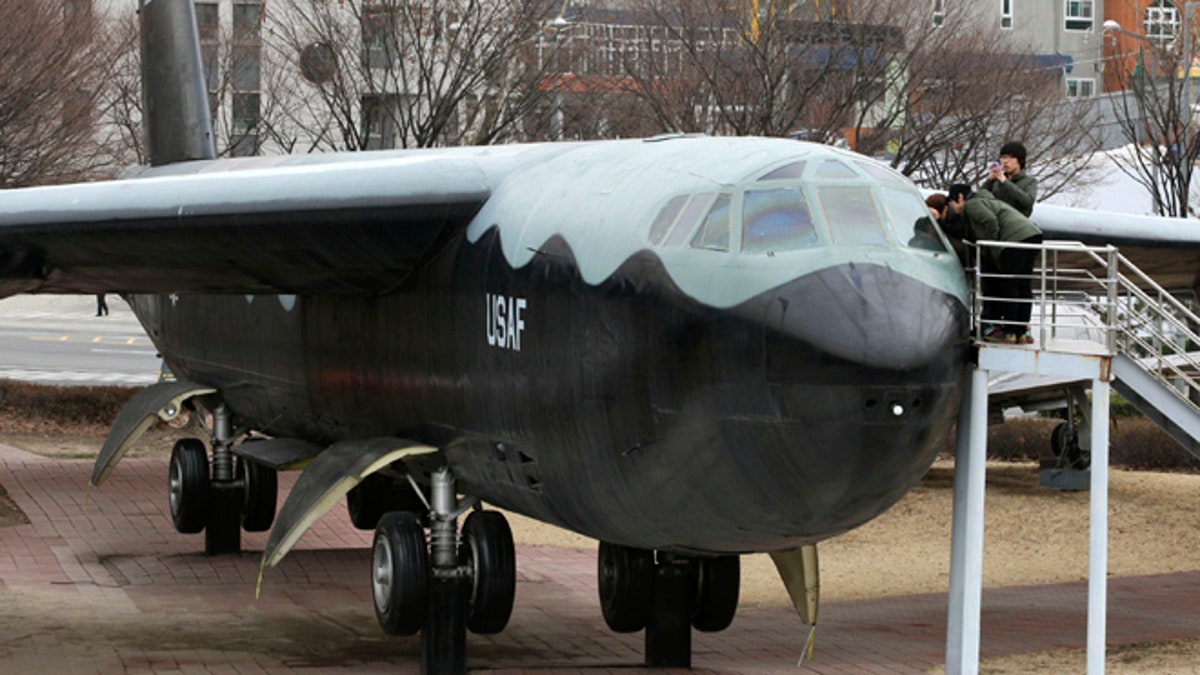
March 19, 2013: Visitors look inside a U.S. Air Force B-52 bomber on display at the War Memorial of Korea in Seoul, South Korea. (AP)
WASHINGTON – The United States is flying nuclear-capable B-52 bombers on training missions over South Korea to highlight Washington's commitment to defend an ally amid rising tensions with North Korea, Pentagon officials said Monday.
Pentagon press secretary George Little said one B-52 flew over South Korea on March 8, and the deputy defense secretary, Ashton Carter, said during a visit to Seoul that another bomber mission is scheduled for Tuesday.
B-52 bombers are capable of launching nuclear-armed cruise missiles, but Little said those participating in the Korean exercise are not armed with nuclear weapons.
The use of Air Force warplanes as part of an annual U.S.-South Korean military exercise called Foal Eagle is not unusual. But the Pentagon used the occasion to draw attention to the role B-52 bombers play as part of an American nuclear "umbrella" over South Korea and Japan -- both of which feel threatened by North Korea's development of nuclear weapons and ballistic missiles.
"We're deeply concerned about North Korean behavior and rhetoric," Little told reporters.
In a more dramatic demonstration of that concern, Defense Secretary Chuck Hagel on Friday announced that the U.S. is beefing up its defenses against a potential North Korean missile attack on the U.S. He said that over the coming four years the Pentagon will add 14 missile interceptors to the 26 it already has in place at Fort Greely, Alaska, at an estimated cost of $1 billion.
Hagel cited three recent developments in North Korea that prompted the Obama administration to act, including a nuclear test in February deemed reckless by Washington and condemned by the United Nations Security Council.
Hagel also cited Pyongyang's launch in December of a rocket that put a satellite into orbit and demonstrated mastery of some of the technologies needed to produce a long-range nuclear missile. And he noted that last April the North Koreans put on public display a road-mobile intercontinental ballistic missile, the KN-08. Navy Adm. James Winnefeld Jr., vice chairman of the Joint Chiefs of Staff, said that missile is believed to be capable of reaching U.S. territory.
Although not mentioned by Hagel, the North Koreas raised tensions further by threatening last Thursday to pre-emptively attack the U.S. Among its recent declarations, North Korea has said it will no longer recognize the armistice that ended the 1950-53 Korean War, though it has made such remarks before.
Carter said in Seoul on Monday that he discussed with South Korean officials the North's "continued pattern of provocative actions" and offered assurances that the budget crisis in Washington will not weaken the U.S. military commitment to South Korea.
North Korea routinely condemns U.S. and South Korean military exercises as provocations and unwarranted preparations for war.












































